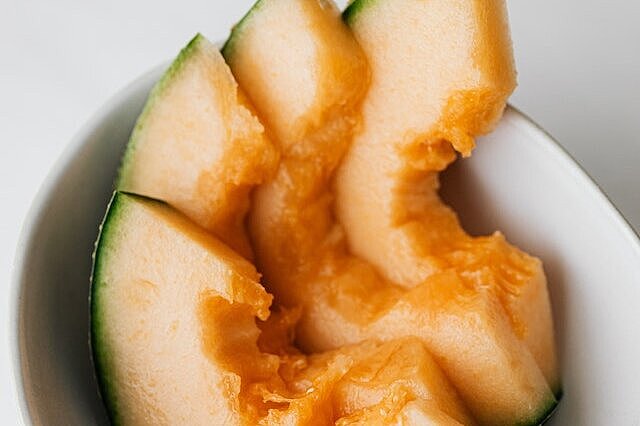Cantaloupe melon

Cantaloupe melon, a summer delicacy known for its juicy, sweet flesh and rich nutritional palette, not only delights the human palate, but also has the potential to be a healthy addition to the diet of our four-legged friends. However, as with any addition to the usual diet, there are pros and cons that need to be carefully weighed up. This article provides an in-depth look into the world of cantaloupe melon as it relates to dogs, its potential health benefits and the risks it may pose.
What is cantaloupe melon?
Cantaloupe melon belongs to the gourd family and is a popular refreshment, especially in the summer months. This type of melon is characterized by its net-like skin and bright orange, juicy flesh, which is rich in water, vitamins and minerals. Cantaloupe melons are not only a source of hydration, but also provide a wealth of health-promoting nutrients.
Benefits of cantaloupe melon for dogs
Hydration
Cantaloupe melon is largely made up of water, making it an excellent source of hydration, especially on hot days.
Rich in nutrients
This type of melon is rich in vitamins such as vitamin A and C, which are important for maintaining good eyesight and a strong immune system in dogs. Minerals such as potassium also support heart health and muscle function.
Low calorie content
Cantaloupe melon is low in calories, making it an ideal snack for dogs that are prone to obesity or need a low-calorie diet.
Risks and disadvantages
Potential gastrointestinal problems
As with any addition to the usual diet, cantaloupe melons can cause gastrointestinal problems such as diarrhea or stomach upset in some dogs, especially when fed in large quantities.
Danger from seeds and peel
The seeds of cantaloupe melons can pose a choking risk to dogs and should be removed before feeding. The rind of the melon is difficult to digest and can cause gastrointestinal problems, and pesticide residues can also pose a health risk.
Guidelines for feeding cantaloupe melon to dogs
- Moderation is key: Feed your dog cantaloupe melon only in small amounts as an occasional treat.
- Remove seeds and rind: Make sure the melon is free of seeds and remove the rind to minimize risks.
- Observe your dog's reaction: Pay attention to how your dog reacts to the melon and adjust the amount accordingly.
Cantaloupe melon can be a healthy and tasty addition to your dog's diet, provided it is fed responsibly and in moderation. The benefits, such as hydration and nutrition, make it an excellent summer snack. However, it's important to recognize potential risks and take steps to minimize them.
If you notice any signs of hypersensitivity or poisoning in your dog, you should see your vet immediately. We are not a substitute for a vet, but we try to be as accurate as possible. Every dog reacts differently and we recommend you get a second opinion or consult your vet if in doubt.
Stay healthy and take good care of your four-legged friend!😊
Similar to Cantaloupe melon
The Charentais melon is a variety of cantaloupe melon, known for its small to medium size, green striped rind and bright orange, incredibly sweet flesh. This type of melon is particularly popular in...
The galia melon, also known as the sugar melon, is a variety of the genus Cucumis and belongs to the pumpkin family. It is characterized by its round shape, yellow-green skin and juicy, light green...
The honeydew melon is a commercial type of sugar melon (Cucumis melo) and is characterized by its yellow fruit. It belongs to the gourd family and originally comes from Africa or Asia. Honeydew...
Sugar melon, also known as honeydew melon or cantaloupe, is a round fruit with a yellow-orange skin and orange-colored flesh. It belongs to the gourd family and originally comes from Africa. Sugar...



